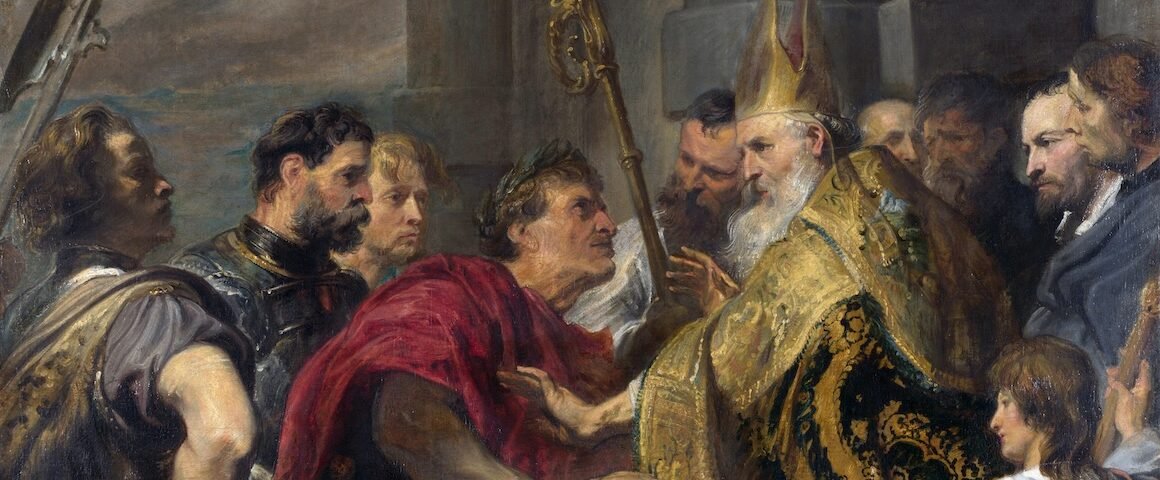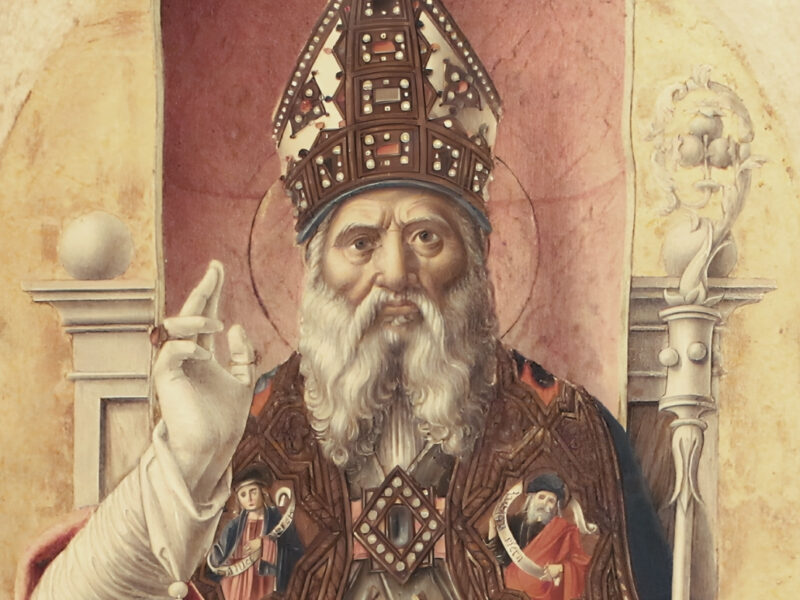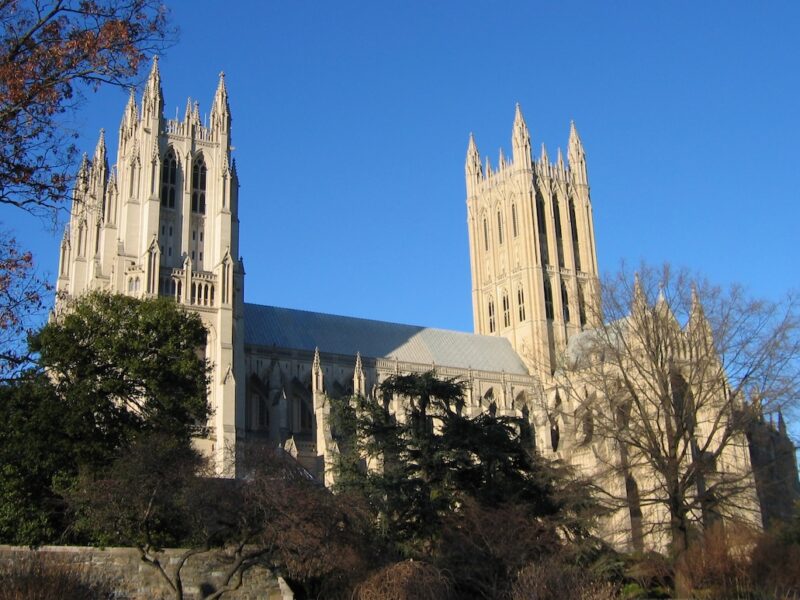What follows are some thoughts about the extent and limits of the church’s obligation to obey the civil authorities. This is particularly relevant to the recent closing of hundreds of churches in Rwanda by the Kagame regime.[1] Nevertheless, I would not begin to presume to offer any admonition or advice to Rwandan believers in general and to our Anglican family in particular as I am not in their shoes – but they are definitely in my prayers. That said, the original events that occasioned this reflection occurred right here at home. Of course, I am speaking of the state’s mandates and directions given to churches during the pandemic some years ago.
Before anyone tries to run to the tall grass of Romans 13:1-7 or 1 Peter 2:13-17 to justify indiscriminately going belly up before the state, be reminded that St. Paul was not beheaded nor was St. Peter crucified upside down because they thought honoring God-ordained authority meant obsequious, quivering capitulation to ungodly rulers and anti-Christ laws. Shadrach, Meshach, and Abednego anyone?
Also, as I offer these thoughts, past experience has demonstrated that the pandemic is such a trigger issue for some people that they were, on first reading, unable to interact with the point of this short essay. That point is summed up in the question: When can the church tell the state No? With that in mind, the reader is encouraged to not miss the point. This is not an essay about the pandemic per se.
With that in mind, whatever your view of the legitimacy of the government responses to the COVID-19 pandemic, it is undeniable that, in almost every one of the fifty states, we saw an unprecedented use of emergency powers to ostensibly combat the virus. And by unprecedented, I mean that the actions by the executive branch of my home state of North Carolina, for instance, were without precedent in their scope or longevity. Please don’t misunderstand me. All things being equal, I think our governor attempted to act wisely and not to use the pandemic as an opportunity to penalize political opponents or groups he personally may have held in low esteem. While I don’t agree with all of the actions taken by our governor, I choose to believe his intentions were good. However, all this does raise the question: How far does the local, state, or federal government’s power extend to direct the life and practices of the church?
The fact is that the church and the state will answer that question in different ways. Simply because the state may legally require something of the church does not necessarily mean that the church, under God, will elect to submit to such a requirement. In other words, the state may tell the church it has to perform or refrain from a certain action. In such a case the church may be obliged, under the direction of the Word of God, to refuse the demands of the state. The church does this knowing full well that the state may enact penalties that harm the church as a consequence of its civil disobedience. Everything that I have just stated has 3000+ years of Jewish and Christian history and the warrant of Scripture behind it.
As it relates to the regulations imposed by the state over churches during the pandemic, the church may have elected to obey for the sake of prudence. (I am hesitant to add “because of love of neighbor” as a qualifier because that phrase has been misappropriated in recent years to promote all kinds of unbiblical nonsense and mischief, particularly in evangelical circles.) That is to say, some of the requirements the state imposed did not strike at the heart of Christian faith and practice and were measures some churches followed for what they believed to be the common good.
However, the state has no ultimate binding authority over the church to regulate those things that pertain to the essence of the Christian faith (viz., Articles of Religion: Article XXXVII, 1801 Amendment). It may think that it does, and may act as if it does, but it does not. That some Christian readers actually find this assertion alarming is at best unfortunate and at worst a demonstration of a gross failure of Christian formation. In reality, from the time of the apostles, the church has had to occasionally tell the governing authorities that “We must obey God rather than men” (Acts 5:29). This conviction that God’s authority supersedes the state’s authority has brought about trouble for God’s people since at least the time of the Pharaohs (c.f. Exodus 1:15-21).
Anglicans are often knee-jerk Erastians. Here’s a tonic for that disposition: The One, Holy, Catholic and Apostolic Church does not believe and has never believed that civil governments have ultimate binding authority on earth. Rather, we obey the words of our Lord Jesus Christ to “render therefore unto Caesar the things which are Caesar’s; and unto God the things that are God’s” (Matthew 22.21). Furthermore, we believe that Jesus Christ is “King of kings and Lord of Lords” (Revelation 19:16). We believe that “all authority in heaven and on earth” (Matthew 28:18) has been given unto Jesus. We believe that “The kingdom of the world has become the kingdom of our Lord and of his Christ, and he shall reign forever and ever” (Revelation 11:15). Notice the tense of that sentence. Jesus has supreme authority over every earthly power right now and forever more, not merely in some distant future! In the words of the Dutch theologian and statesman Abraham Kuyper, “There is not a square inch in the whole domain of our human existence over which Christ, who is Sovereign over all, does not cry: ‘Mine!’”
So, what does this mean on a practical basis in relation to present and future state injunctions regarding the church?
- The state has no ultimate authority to tell the church it may not assemble for worship. We are commanded in Holy Scripture not to forsake “the assembling of ourselves together” (Hebrews 10:25).[2] We may, under our ecclesial authority (i.e., our bishop) limit meeting together as a prudent temporary response to a pandemic. However, my home state of North Carolina (or the state of North Korea for that matter) has no ultimate authority to tell the church it may or may not gather. Nevertheless, we have to accept the consequences, however unjust, of our civil disobedience. Worship is still commanded by God, and no matter what Caesar may think or claim, he is not God.
~
For example, in 303 AD, “Emperor Diocletian forbade Christians, on pain of death, from possessing the Scriptures, from gathering on Sundays to celebrate the Eucharist and from building places in which to hold their assemblies.”[3] Yet, in 304 AD forty-nine Christians in the North African city of Abitene were arrested for defying that edict by gathering for the Sunday Eucharist. When the proconsul demanded to know why they defied the emperor’s law, knowing that it would lead to their torture and death, the martyr Emeritus replied, “Sine dominico non possumus.” In other words, “We cannot live without gathering to worship on Sunday.” Those forty-nine Christians died after terrible tortures because they understood the state could not forbid the church to gather for eucharistic worship.
~
And, by the way, a local church is not obliged to obey its bishop if said bishop were to indefinitely suspend worship on the Lord’s Day in order to comply with the state. For such an episcopal requirement would fail the qualification of being “lawful and honest.” The “law” in this instance is first the mandate of Holy Scripture, then the church’s formularies and canons, and coming in at a distant third, the law of the state.
~ - The state has no authority to dictate to the church how it administers the sacraments. The state cannot define the terms by which the church offers the sacraments of the Eucharist or Holy Baptism as commanded by our Lord Jesus Christ (1 Corinthians 11:23-26; Matthew 28:19). Lamentably, during the pandemic certain municipalities forbade the distribution of Holy Communion. Such state bans against the Lord’s Supper occurred in various locations around the country such as Wake County, North Carolina,[4] Howard County, Maryland,[5] and Knox County, Tennessee.[6] In those cases, the state exceeded its authority and Christians were under no biblical obligation to obey such edicts.
~ - The state has no authority to command the church not to sing praises to God. The biblical commands and admonitions that we sing praises to God are so numerous there is no need for citation. Let this one apostolic appeal suffice: “Be filled with the Spirit, addressing one another in psalms and hymns and spiritual songs, singing and making melody to the Lord with your heart” (Ephesians 5:18b-19). Again, we may choose, in an abundance of caution, to not sing during our services. But the state does not have the authority to command the church not to sing.
I could provide more examples of when the church must tell Caesar, “You have overstepped your bounds and we will not obey.”[7] Just start with the Hebrew midwives (again, Exodus 1:15-21) and keep reading.[8] However, here is a brief maxim to guide our steps:
When Caesar (i.e., the state) commands that which Christ forbids, or forbids that which Christ commands, the Christian is compelled by conscience to disobey Caesar.
As St. Augustine said, “Lex iniusta non est lex.” “An unjust law is no law at all.” And that which contravenes the Divine Lawgiver is, by definition, unjust.
Notes
- juicyecumenism.com/2024/09/13/state-control-churches-rwanda/ ↑
- “We are forbidden to neglect the assembling of ourselves together. Christianity is already institutional in the earliest of its documents. The Church is the Bride of Christ. We are members of one another.” C.S. Lewis, The C. S. Lewis Collection: Essays and Speeches, (HarperOne, 2017), 107. ↑
- Homily of His Holiness Benedict XVI, Esplanade of Marisabella, delivered Sunday, 29 May 2005, https://www.vatican.va/content/benedict-xvi/en/homilies/2005/documents/hf_ben-xvi_hom_20050529_bari.html, accessed April 15, 2023. ↑
- adflegal.org/press-release/nc-county-confronted-targeting-churches-covid-19-related-order ↑
- www.catholicnewsagency.com/news/44650/maryland-county-bans-eucharist-in-church-reopening-order ↑
- www.getreligion.org/getreligion/2020/5/13/talk-about-burying-the-lede-local-officials-wanted-to-open-up-while-banning-holy-communion ↑
- Granted, the state can enact laws that result in the suffering of the church and yet the church is still, in many cases, obliged to obey. A relatively minor hypothetical example of this would be the revocation of theologically conservative churches’ tax exempt status. It would create real hardship and diminish those churches’ ability to do mission and ministry, but such churches would be bound to comply. Nevertheless, the state cannot coerce the Bride of Christ to sin either by omission or commission. ↑
- In one sense the entire biblical genre of apocalyptic literature – Daniel, Revelation, etc. – deals with the responsibility of the faithful to refuse the demands of the state when such demands result in disloyalty to God. ↑





'We Cannot Live Without Sunday: When Can the Church Tell the State, No?' have 7 comments
October 21, 2024 @ 9:58 am Cynthia Erlandson
AMEN!
October 21, 2024 @ 11:17 am Paul William Erlandson
What’s sad is that, here in Michigan, the Governor’s series of Executive Orders always included an exception for religious assemblies. And yet, most churches STILL closed down. Very weak.
October 21, 2024 @ 9:12 pm Stephanie
I reached a deeper level of despair and depression than I thought possible during the pandemic while my church was closed. I wish my parish had not done it. My heart and soul recovered, but it was not right to put me and other parishioners through that. If such orders ever come from the state again, we must refuse to obey.
October 22, 2024 @ 10:20 am Rhonda (Mrs. Andrew) Merrick
Excellent maxim at the end. I must have absorbed more than usual amounts of Scripture in my upbringing, for this was obvious to me even as a teen, or perhaps reading C.S. Lewis at a young age catalyzed it. By this yardstick those who remember the strategy of the Operation Rescue organization, in headlines nearly 40 years ago, may conclude (or did conclude) that they had no biblical ground to defend their actions.
October 23, 2024 @ 2:45 pm Rev. Christopher C. Little
Absolutely. After all this time, my blood still boils when I think of how so many clergy closed down services and made the sacraments unavailable. They had better think twice next time, if, God forbid, something like COVID happens again.
I am proud that my jurisdiction, the Orthodox Anglican Church, refused to go along with this nonsense. I am so very sorry to hear about your experience.
October 22, 2024 @ 12:20 pm August Napotnik
Read the Americanized version of the WCF. Chapter 23. No church that subscribed to the WCF was under obligation to close their doors. They did so out of illiteracy of the very documents they subscribe to and/or straight fear mongering. In both cases they showed who their king was..Caesar.
October 23, 2024 @ 1:18 pm Fr. Benjamin Butler
A good resource on the historical relationship between Church and State is a book by Hugo Rahner called Church and State in Early Christianity.